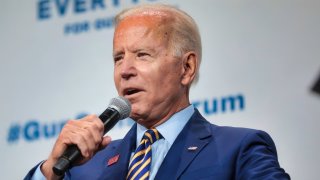Congress Must Hold Joe Biden Accountable for His Disastrous Haiti Policy
Haiti’s perpetual chaos often falls on deaf ears in Washington, with policymakers accepting the cycle of instability in that country as the status quo. Ruthless gangs have long plagued Haiti, but since the July 2021 assassination of President Jovenel Moïse and the U.S.’ coronation of his widely unpopular and unelected replacement Ariel Henry, violence and territorial disputes have jumped into overdrive.
Haiti’s perpetual chaos often falls on deaf ears in Washington, with policymakers accepting the cycle of instability in that country as the status quo. Ruthless gangs have long plagued Haiti, but since the July 2021 assassination of President Jovenel Moïse and the U.S.’ coronation of his widely unpopular and unelected replacement Ariel Henry, violence and territorial disputes have jumped into overdrive.
Much of the blame for the acutely worsening conditions in Haiti lies at the feet of the Biden administration.
Conditions in Haiti are catastrophic. Disease outbreaks and massacres have become common. Kidnappings are an everyday part of life. Forcible recruitment of minors into gangs and sexual violence is rampant. Orchestrating this chaos are Haiti’s criminal, economic, and political elite who operate like warlords, using these violent gangs to advance their agendas. Gangs have effectively taken over the capital city of Port-au-Prince. They have better firepower, more manpower, and more resources than the U.S.-funded Haitian National Police.
What Collapse Looks Like
The gangs proved their mettle when they stormed into two of Haiti’s largest prisons and released nearly 4,000 prisoners, including top gang leaders. At the same time, police stations were ransacked, and prison guards fled the jails.
The U.S. Embassy, which is operating on a skeleton crew given deteriorating security conditions, warned Americans to immediately depart the island. During the chaos, gunfire even struck a plane loaded with passengers. Jimmy Cherizier, a former Haitian police officer turned gang leader, known as “Barbecue,” led a mobilization of gangs to oust Henry while he traveled to Kenya to sign a U.S.-sponsored deal to deploy Kenyan forces to Haiti. Clearly, the political powerbrokers have returned to their weapon of choice.
Right now we are witnessing in real time the collapse of the Haitian state, but also of the United States’ credibility. I was the lead Republican staffer for the Western Hemisphere on the House Foreign Affairs Committee and witnessed firsthand how the Biden administration bungled this mess. Following the assassination of Moïse, Haiti found itself without a legitimate successor to a leader whose legitimacy was widely disputed.
Due to a series of convoluted missteps from his predecessor, Michel Martelly, Moïse’s election and inauguration were delayed. The political instability worsened when Moïse himself postponed presidential, legislative, and local elections, leaving Haiti without its other branches of government. Until his assassination in July of 2021, Moïse ruled by executive decree. It was under this system that he also nominated Henry as his second-in-line. Widespread outrage and rejection of Henry’s legitimacy was predictable and predicted. Haiti has not held elections since 2016 yet is governed by a caretaker prime minister, unchosen and unsupported by the people.
Important Questions for Haiti’s Future
In the post-assassination period, the U.S. led efforts to break the political gridlock and find a workable solution for Haitian stakeholders. They were repeatedly warned that anointing a leader and insisting the Haitian people accept him was both politically unsustainable and unpopular. Haitian civil society across the ideological spectrum also warned foreign powers against an intervention. Ultimately, the Biden administration did the opposite. It is proposing a Kenyan-led multinational security force, where Kenya is poised to send 1,000 police officers and Benin has offered 2,000 troops.
Regardless of how the Biden administration attempts to minimize it, this is a U.S.-sponsored and funded foreign intervention and should be examined with the utmost scrutiny by Congress.
If I were still advising members of Congress, I would encourage them to ask the Biden administration the following questions.
If gangs are operating at the behest of political stakeholders, how will a widely rejected international intervention improve the gridlock? What safety measures are being implemented to prevent U.S. forces from having to intervene? A broad coalition of Haitian civil society opposes this multinational security force, but who is calling for foreign forces to stabilize Haiti? How exactly are Kenyan police and Beninese soldiers uniquely suited for this mission? Walk us through your plan, including the specific mission set, objectives, and the timetable or change in conditions by which forces will depart the country. Have the nations who are sending forces conducted wargames to anticipate and plan for worst-case scenarios? Why is the State Department leading the oversight and planning for this operation, and why is it not the Pentagon? What steps are being put in place to prevent the abuses and disease outbreaks that marked previous international occupations in Haiti?
The Biden administration allowed themselves to be manipulated and used as pawns in the power struggle between warring Haitian factions. If there was ever a time for vigorous and bipartisan Congressional oversight, it is now.
About the Author
Ana Rosa Quintana-Lovett is currently the Senior Policy Director at the Vandenberg Coalition and a Visiting Fellow at the National Security Institute at George Mason University's Antonin Scalia Law School. She most recently served as the Staff Director for Western Hemisphere for House Foreign Affairs Committee Chairman Michael McCaul (R-TX). In that capacity, she was the lead Republican advisor in the U.S. House of Representatives on U.S. policy towards Latin America and the Caribbean. Prior to her time on the hill, she led the Latin America portfolio at The Heritage Foundation for nearly eight years and also served at the Defense Intelligence Agency. She is also a Board Member for the Strategic Intelligence Program at Patrick Henry College.
Image Credit: Joe Biden 2020 Flickr.


